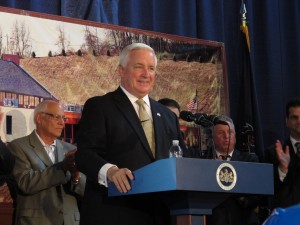Corbett Argues Impact Fee's "Preemption" Language Would Create Jobs
Governor Corbett says language in HB 1950 “superseding and preempting” municipal drilling regulations isn’t meant to usurp authority from local governments, but rather to strengthen preexisting laws.
In a letter distributed to lawmakers, Corbett points out a section of the 1984 Oil and Gas Act already overrides local ordinances, but municipalities have been able to pass and enforce their own regulations, due to court interpretations of the legislation. “My proposed amendments…reaffirm and reinforce the original legislative intent of the law,” the governor writes. “Further, my proposal offers additional, real and meaningful protections for local communities that host gas development.”
The letter, which was provided to StateImpact by a House staffer, is the first time Corbett has voiced an explanation for the controversial section of HB 1950, which was provided to House Republican leadership by his administration. The governor has yet to speak publicly about the preemption language.
Corbett goes on to detail the environmental protection aspects of the bill, which includes increased civil penalties for drillers who violate DEP regulations, larger areas of presumed liability, and wider buffer zones between natural gas wells and water sources. “My goals are not much different from that of local government, conservationists, or other policymakers,” he writes. “We all want clean air, clean water, and safety in this growing industry. These are simple but common goals which unite us. But there is one other goal that we all share – an environment of JOB CREATION in the Commonwealth of Pennsylvania.” The preemption language would help foster economic growth, he argues.
Click here for a full look at HB 1950’s provisions, and read Corbett’s entire letter below:

















